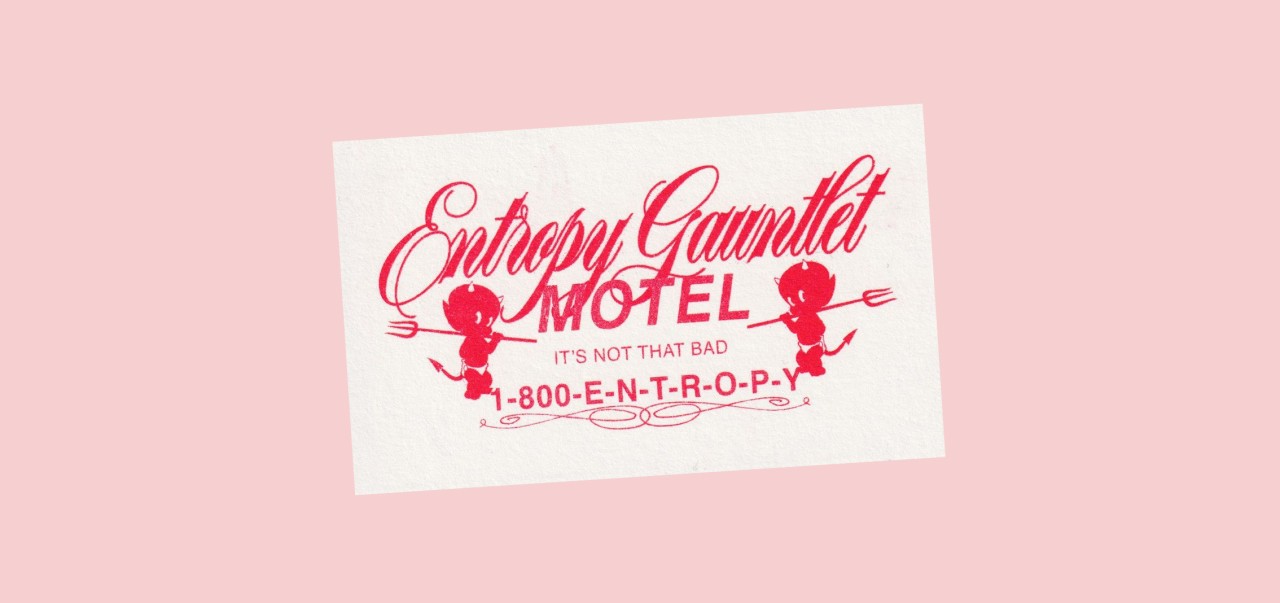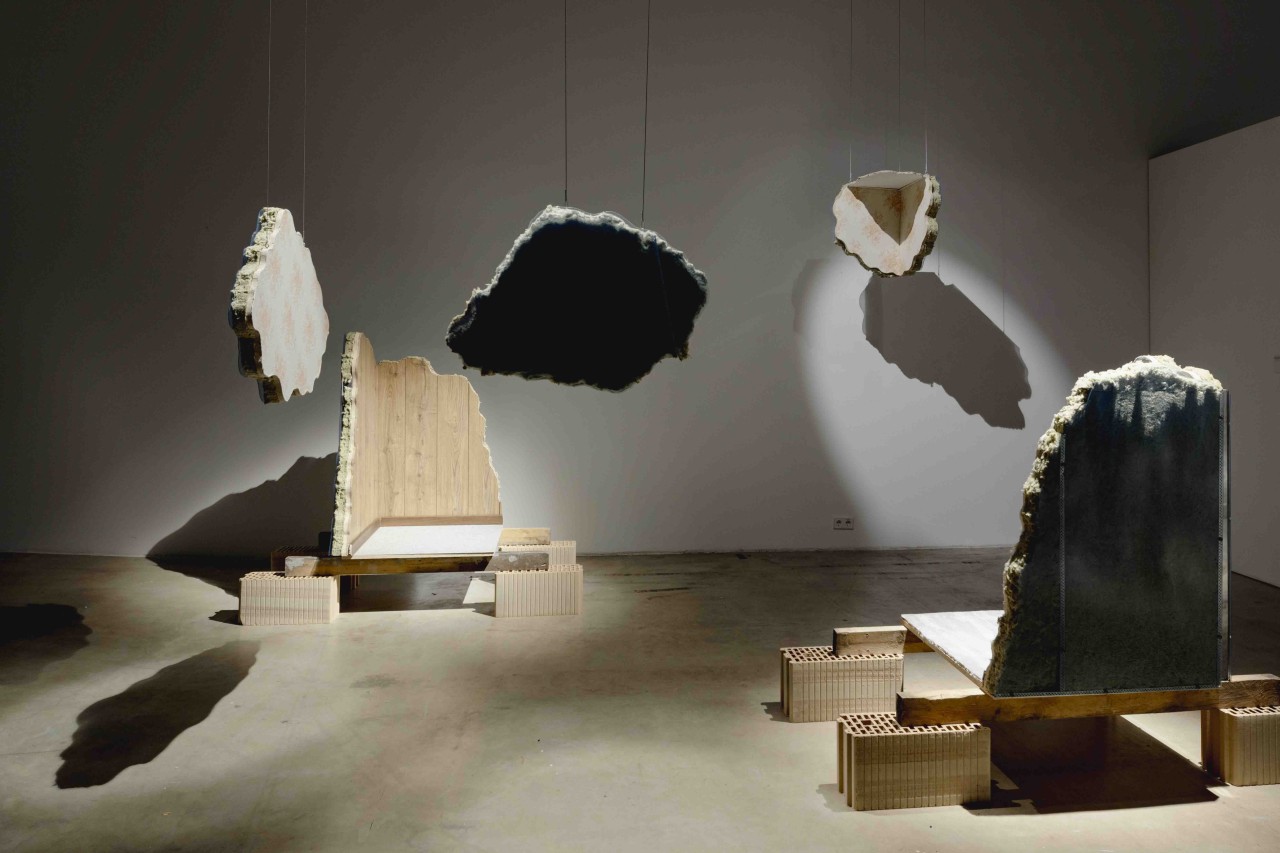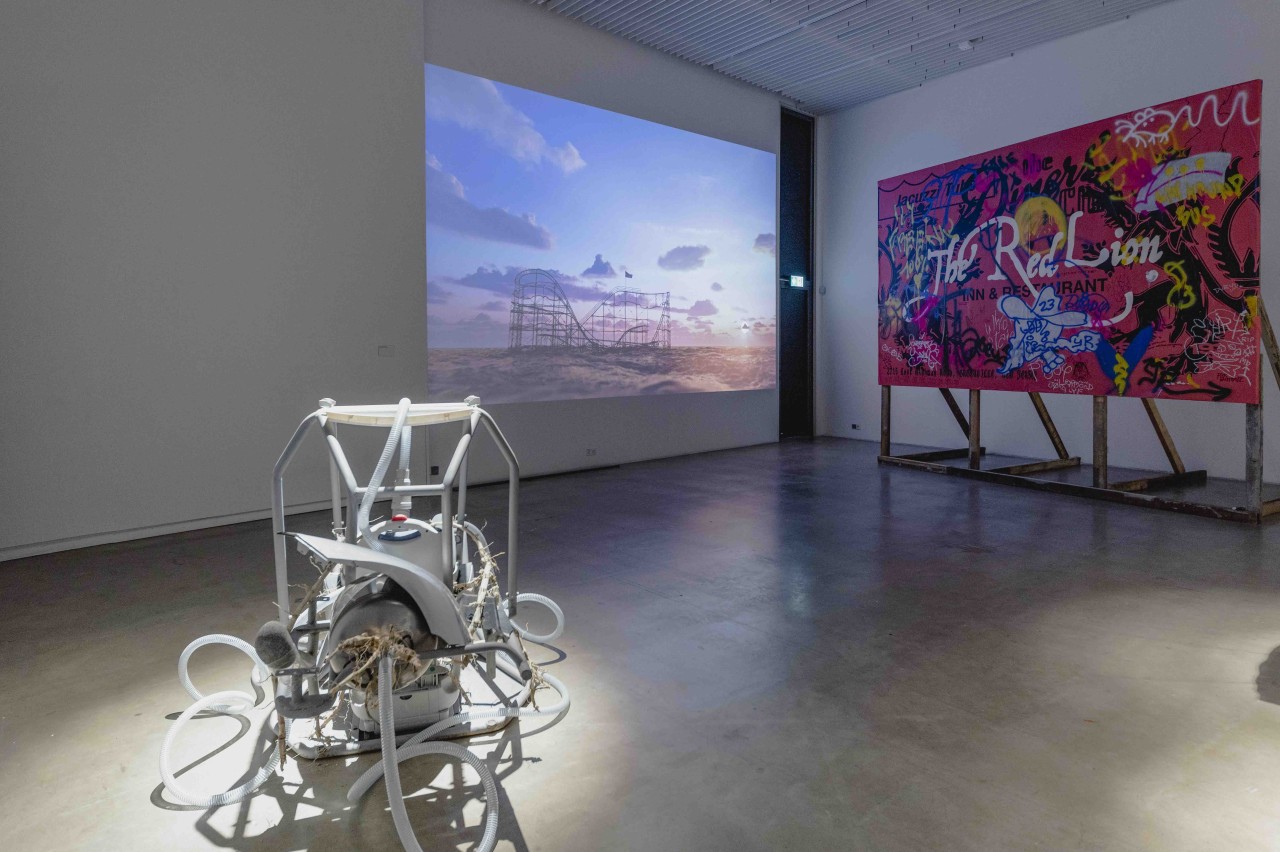Published on
30.06.2023
Taylor “Tex” Tehan is an M.A. Graphic Design student from the United States and an interdisciplinary practitioner. Working with textiles, sound, metal, wood and film, his work is influenced by the landscape, nostalgia, speculative futures, mythology and romanticism of the American West. Previously working in the fashion industry, Tehan has worked as a designer for various brands, including a recent traineeship on the Menswear Design Team at Louis Vuitton in Paris. His interests meet at the cross section of fashion, music, contemporary art, film and graphic design, with a strong emphasis on experiential-environmental themes.

A middle-aged man sits alone in a motel room. Mouldy apricot coloured carpet, stained with a combination of bodily fluids and booze adds to the musty odour of cigarettes and a faint smell of cum. The faux wood panelling is a failed attempt at sequestering the obvious lack of money devoted to the room’s decor, as are the stock photographs framed above each of the two double beds. The popcorn ceiling is embedded with dust, and he wonders to himself how gravity allows this to happen. The television is on, and a barely audible soap opera is flickering methodically on the chest of drawers. The two chairs, one of which he is occupying, are not the same, and the circular table has a hard bound folder with laminated pages welcoming him to city “x”, and informing him of the sites to see. Beside the folder is a half filled ashtray with his partially smoked cigarette still burning. One suitcase rests next to the lone wardrobe towards the back of the room, and it is hard to determine whether he has been there for two hours or two weeks. In between the beds are a bedside table with an alarm clock, telephone and remote control. The drawer in the bedside table is cracked just enough to notice a Gideon’s Bible and a half used box of condoms. The curtains are almost fully drawn, except for a small crack providing an opportunity for the neon “vacancy” sign on the motel lobby entrance to illuminate a section of the man’s face.

Driving across the United States, one encounters ghosts of production – dilapidated factories, antiquated rail lines and abandoned highways litter the American landscape. Among the trails of industrial trash are dystopian motels, diners and gas stations that remind us of a prosperous past that dissipated with the rise of automation and the out-sourcing of manufacturing. Even more discreet, are the homogenous warehouses used by Amazon and UPS, where things are neither manufactured nor produced. Shipping centres where production happens elsewhere are understated arteries used to send billions of items per year to droves of consumers around the states. Less concerned with the working conditions of its employees and obsessed with efficiency, the corporations that drive these facilities mirror a similarity to the shipping of people from one chain motel to the next. These liminal spaces left in the wake of the growth of the service sector provide a metaphor for the absurdities that exist in an American cultural context. Forgotten places, abandoned dreams, fragmented memories and the nostalgia that exists around these myths were the concepts we sought to explore in the Entropy Gauntlet exhibition.
The roadside motel makes cameos in film, literature and philosophical discourse. A place unfamiliar and familiar for people that have never been to the United States, the ubiquity of the motel in cultural production has afforded viewers from abroad with an understanding of the depraved and tragic encounters that may or may not happen in these rooms. Despite the disturbing scenes found in works like Alfred Hitchock’s seminal film Psycho, these places are not desirable, yet necessary, destinations for people seeking to road trip across America, unless you intend to sleep in your vehicle in a Wal-Mart parking lot.
The beige bathtub does not match the white tiles adorning the walls of the bathroom. The white towels are stiff, and slightly frayed with no sign of fabric softener in their texture. The off-white bar of soap on the sink has two hairs, one short and one long. Behind the mirror lies a plethora of travel sized accessories ranging from toothpaste to antidepressants. The small bathroom bin is full, a clear oversight on the part of the room service attendant’s daily cleaning duties. The small hexagonal floor tiles are just cold enough to remind someone of the fact that the management forgot a bathroom mat. He walks into the bathroom, and turns the harsh fluorescent light on overhead. Carrying a bottle of lotion, he lowers his trousers and sits on the toilet.

In T.S. Eliot’s poem, The Waste Land, he refers to nostalgia as “mixing memory with desire”. We often look back on things fondly from our childhood, due to our freedom from responsibility and the innocence of youth. The Red Lion is an existing motel that I frequented in summers with my family as a child. The desire we have to re-enact memories is unattainable. For the Entropy Gauntlet exhibition, I made a series of sculptures that were replicas of rooms in the motel. Having not visited the motel in 25 years, I felt a strong urge to look up images of the rooms online. Yet, in an exercise to test the accuracy of memories and nostalgia, I managed to refrain until after the structures were built. Eventually, I looked up the motel on Google, only to find that one of my pieces accurately depicted the spaces I had tried to replicate. The motel was underwhelming at best, and the inaccurate objects built for the exhibition were likely a series of various motel rooms that blended into one over time. What we find when we venture back to these places, is often a much less exciting site than we recalled in our minds.
The roadside motel is an omnipresent feature upon the sprawling face of continental

Although the roadside motel still exists in our memory, in reality it has been replaced by the corporate motel, and the mass standardisation that comes with post-industrialism. We think of mom-and-pop establishments when we reflect on this particular nuance in the USA, yet the truth is that the vintage neon signs that previously illuminated their parking lots have been exchanged for Super 8 and Howard
Corporate motels are beginning the transition of removing the human element from the experience of staying in their rooms. Disguising self-check-in as an extension of ease and better service, the true incentive is to increase profits by hiring fewer people. As this type of automation pervades the remaining sectors of motel operations, the empty front desk serves as a metaphor for the decaying opportunities in the 4th wave of industrialism. As the lines between physical, digital and biological spheres become increasingly blurred, the scales tilt towards those in power. This only perpetuates the problem with hyper-capitalism, and the extent to which the disparity between advanced technocracies in the West and their developing counterparts grows.
The phone rings, six times before he finally places his hand on the handle and lifts the receiver to his ear. A muffled voice instructs him in coded language, and hangs up. He places the phone down, and sits on the bed furthest from the door. Pondering the instructions given to him, a thought occurs to him about his temporary residence. Each of these rooms are different, but always the same. Perhaps this is similar to his jobs, always slightly different from the previous one, the outcome is always the same. Maybe these two things exist in tandem for a reason. Life is temporal, as is his stay in these rooms. Forgotten spaces void of permanence.
References
- This sentence was co-written with Zody Burke for the Entropy Gauntlet exhibition.
- Super 8 and Howard Johnson are corporate motel chains located across the United States.